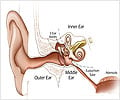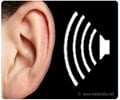Temporary hearing loss after listening to loud music may be a defensive mechanism of the ear to protect itself.

On exposing mice to loud sound, the researchers found that the temporary reduction in hearing was accompanied by a release of hormone by cells in the cochlea.
“Our research shows that the ear can adapt to high noise levels and keep operating. But there is a catch - because our hearing adjusts, we think the sound has a lower volume than it actually has and we can easily exceed the capacity of the ear. Other research shows people are regularly listening to personal music devices in excess of 100 decibels”, Professor Housley said.
Source-Medindia
 MEDINDIA
MEDINDIA




 Email
Email










